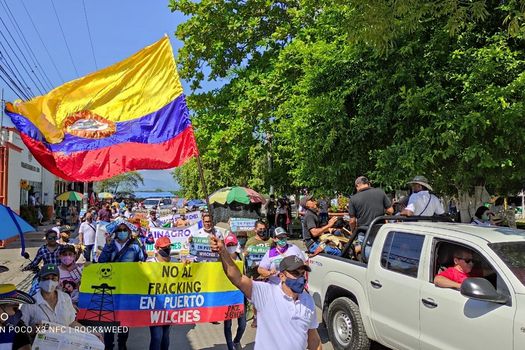Colombia Approves First Fracking Pilot Plant amid Strong Criticism


Orinoco Tribune – News and opinion pieces about Venezuela and beyond
From Venezuela and made by Venezuelan Chavistas

The National Environmental Licensing Authority (ANLA) of Colombia approved, amid criticism from sectors of the political opposition and the social movements, the first fracking pilot project in Puerto Wilches, department of Santander, reported environmental organizations on Monday, March 28.
The project will be developed by the Colombian state oil company Ecopetrol, in an area of up to 4.67 hectares, where fracking will be carried out at a depth of 1.2 kilometers.
The Fracking Free Colombia Alliance denounced the licensing process which was completed “in less than five months, despite numerous objections, serious questioning of the process, and a rise in violence in Magdalena Medio.”
RELATED CONTENT: Colombia: Registrar Will Not Ask Electoral Council for Senate Vote Recount
Desde la Alianza @ColombiaNoFrack rechazamos la decisión de la @ANLA_Col de aprobar la licencia ambiental para el piloto de fracking Kalé de @ECOPETROL_SA.
Seguiremos trabajando para detener estos proyectos y prohibir esta práctica. ¡Vamos por #ColombiaLibreDeFracking! pic.twitter.com/76edsQpMzB— Carlos Andrés Santiago 🌎🍃💦 (@CarlosSantiagoL) March 28, 2022
“It is unfortunate,” added the organization, “that a fundamental issue in energy matters has not been debated in the Congress of the Republic, where the allies of the government delayed for the third consecutive time the discussion of the bills to prohibit fracking, and it was decided by the Duque government, out of eagerness, without guarantees, and a few months before the inauguration of a new president.”
The anti-fracking group also criticized “the false discourse of Duque, who sells himself abroad as a defender of the environment while accelerating fracking projects in Colombia that would generate emissions far exceeding the ‘ambitious’ commitments of the country in climate matters.”
Presidential candidate Gustavo Petro also criticized the fracking project. He wrote on his social media accounts, “Fracking is the most predatory mechanism because it destroys the territories’ water tables to continue an economic system based on hydrocarbons.”
RELATED CONTENT: Petro Could Build Parliamentary Majority: Orinoco Tribune Interviews David Escobar
“Puerto Wilches has a much better future in the agro-industry of small and medium-sized agricultural producers,” he added.
El fracking es el mecanismo más depredador pues acaba con el agua del territorio, para continuar un sistema económico basado en hidrocarburos.
Puerto Wilches tiene mucho mejor futuro en la agroindustria de pequeños y medianos productores agrarioshttps://t.co/9apyyRYdft
— Gustavo Petro (@petrogustavo) March 28, 2022
Anti-fracking activists have decried that the project, named Kalé, was approved “without broad and informed participation of the communities of Puerto Wilches and Magdalena Medio, where for more than a hundred years people have suffered the consequences of environmental and social degradation associated with the conventional exploitation of fossil fuels.”
The hydraulic fracturing technique of petroleum extraction is criticized by a large number of social and environmental activists and scientists, who warn about its environmental, hydraulic and social implications. On the other hand, its defenders argue that it is a solution to the growing demand for energy with cleaner resources than coal.
Fracking is utilized for the extraction of shale gas, a type of hydrocarbon that is found in rock layers at great depths, for which the earth crust has to be drilled and then large quantities of water mixed with chemicals are injected at high pressure to fracture the rock layer and release the gas.
Featured image: Environmental organizations such as the Alianza Colombia Libre de Fracking have denounced the fracking project in Puerto Wilches region of Colombia. Photo: Alianza Colombia Libre de Fracking
Translation: Orinoco Tribune
OT/GMS/SC/EF